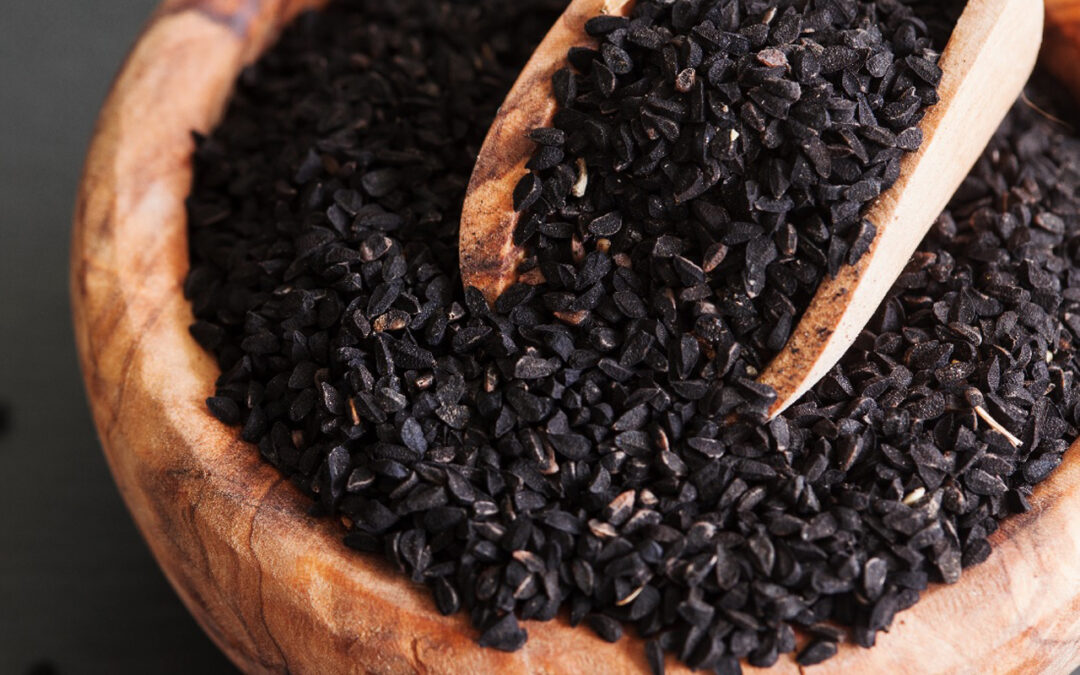The cure for all the ailments?
Nigella sativa or black cumin is an aromatic plant. In Arabic, the Nigella is called “Habbatul baraka”, which means “seeds of blessing”. It is found in the Mediterranean basin and the Middle East.

Nigella seeds have been used for centuries: they are mentioned in the Bible; and the prophet Muhammad claimed that they had extensive healing powers:
“Use this black seed regularly, as it is a cure for all diseases except death.”
For thousands of years, Nigelle seeds have been harvested for roasting, crushing or used for decoction, essential oil and vegetable oil. The seeds are also roasted or crushed for use as food spices in the making of breads, oriental cakes and other culinary preparations.
Nigelle oils are prized in herbal medicine for their antioxidant, immuno-stimulating, anti-infective and antihistamine potential. These are particularly recommended to strengthen natural defenses and tone the body during changes in seasons, especially with the arrival of spring to cope with allergies.
The healing properties of Nigella have been known for a long time. The earliest data on its cultivation and use date back to the time of ancient Egypt when Nigella oil was reportedly found in Tutankhamun’s tomb.
Composition :
Nigella contains many active components, the most imploring being thymquinone, thymohydroquinone and dithymoquinone.
Benefits:
Antioxidant power:
Thanks to the presence of several antioxidant compounds including flavonoids and polyphenols, Nigelle oil has a protective effect:
- Protects the liver and fights oxidative stress;
- Cardio-protective: limits the cellular damage of free radicals;
- Anti-aging effects: prevents premature aging of the body. This can prevent the onset of certain age-related diseases and certain effects of aging. This is why Nigella oil is highly prized in herbal medicine and cosmetics.
Immodulator and anti-infective agent
Nigella acts on the immune system. It has an immuno-modulatory action, i.e. it is able to regulate inflammatory reactions or strengthen the body’s defenses:
- Anti-inflammatory activity: effective against certain inflammatory diseases such as colitis, peritonitis, arthritis or asthma;
- Immuno-stimulating: the ability to strengthen immune responses by promoting the action of T-cells and NK (Natural Killer) lymphocytes.
- Anti-microbial action: Nigelle seed extracts have anti-bacterial activity on staphylococci, also on other germs such as Pseudomonas, Colibacilla or Helicobacter. The Nigella has an antimycosic action on Candida albicans and dermophytes
Antihistamine action
It opposes the effects of histamine, a compound involved in allergic reactions.
Nigella has an antispasmodic effect to prevent the occurrence of spasms in the airways. This is why Nigella is often used to prevent or treat allergies, especially against hay fever, sinusitis and allergic asthma.
Digestive and detoxifying properties
- Antispasmodic action: By limiting the occurrence of muscle spasms, Nigella relieves gastric, intestinal and uterine spasms;
- Carminative activity: helps increase the expulsion of intestinal gases while reducing their production;
- Diuretic action: Nigella has a diuretic action, that is, it promotes urinary secretion. In this way, it facilitates the disposal of waste and toxins from the body;
Hypotensive effect
Nigella prevents high blood pressure.
Regular consumption of black cumin can reduce blood sugar and insulin resistance, making it an effective remedy to avoid type 2 diabetes.
Anti-inflammatory and calming properties of essential oil:

- Reduces headaches, dizziness and painful joints in local applications or massages;
- Treats colds, dental pain (in mouthwashes) and skin problems (psoriasis, acne, eczema, burns).
- Treats acne or skin problems and improves complexion.
Use and dosage
Internal
The most commonly used form of herbal medicine is Nigella oil, extracted from its seeds. But there are also capsules, used as dietary supplements.
The oil:
- For an adult: take 1 to 2 teaspoons, pure or with honey, milk or any other food, during the meal or 1 tablespoon, in the evening at bedtime, for a three-month treatment.
- For a child under the age of 12: taking half a teaspoon a day is enough,
- A child over the age of 12: take 1 teaspoon a day.
The seeds:
A teaspoon of Nigella seeds with honey on an emptying day every morning
External
Nigella oil is generally used pure, in local application and several times a day.
- It can be incorporated into its cosmetic products.
- Nigella oil can be added to boiling water for inhalation.
- The crushed seeds used in cataplasms, to treat certain skin problems.
Nigella’s precautions for use
Consumed in too much quantity, Nigella can be slightly toxic.
On the other hand, there is:
- No contraindications;
- No adverse side effects;
- No interaction with medications;
- No interaction with plants or medicines
– Medical Naturalis –

